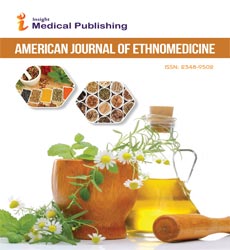ISSN : 2348-9502
American Journal of Ethnomedicine
Integrating Ethnomedicine with Modern Clinical Practices: Opportunities and Challenges
Peters Harty
Department of Integrated Medicine Research, University of Southampton, Southampton, Hampshire, UK
Corresponding author:
Peters Harty,
Department of Integrated Medicine Research, University of Southampton, Southampton, Hampshire, UK;
Email: peters@harty.uk
Received date: February 01, 2025, Manuscript No. Ipaje-25-20601; Editor assigned date: February 03, 2025, PreQC No Ipaje-25-20601 (PQ); Reviewed date: February 15, 2025, QC No. Ipaje-25-20601; Revised date: February 22, 2025, Manuscript No. Ipaje-25-20601 (R); Published date: February 28, 2025, DOI: 10.36648/ 2471-7975.12.1.106
Citation: Olofsen T (2025) Ethnomedicinal Plants in the Treatment of Diabetes Mellitus: A Review. Am J Ethnomed Vol.12 No.1:106
Introduction
Integrating ethno medicine with modern clinical practices represents a promising but complex pathway toward holistic healthcare, where centuries of traditional plant-based, spiritual, and community-driven healing practices intersect with evidence-based biomedical approaches; this integration offers opportunities for discovering novel therapeutics, enhancing culturally sensitive care, and expanding treatment options, but it also raises challenges related to scientific validation, regulation, intellectual property rights, and safe clinical translation [1].
Description
One of the key opportunities in integrating ethno medicine with modern practice lies in drug discovery and therapeutic innovation. Many conventional medicines, such as aspirin, artemisinin, and paclitaxel, originated from traditional remedies. Ethnomedicinal knowledge provides leads for pharmacological screening of bioactive compounds with antipyretic, antimicrobial, anticancer, or neuroprotective potential. By bridging traditional wisdom with laboratory validation, researchers can uncover plant metabolites, mineral compounds, and holistic formulations that may fill therapeutic gaps, especially in areas like antimicrobial resistance, chronic metabolic diseases, and supportive oncology. Such integration also fosters respect for cultural heritage while making healthcare more inclusive and adaptive to patient beliefs. In clinical settings, integrating ethnomedicine can improve patient compliance and satisfaction by recognizing cultural values. For instance, physicians who acknowledge and incorporate safe traditional remedies into treatment plans foster trust with patients from indigenous or rural backgrounds Collaborative models such as integrative clinicsâ??where herbalists, traditional healers, and biomedical practitioners work togetherâ??can enhance the quality of care, especially in resource-limited settings. Furthermore, ethno medicineâ??s holistic focus on balance, diet, and lifestyle complements modern preventive medicine by addressing psychosocial dimensions of health, which are often underemphasized in conventional practice [2]. However, significant challenges complicate this integration. Standardization and scientific validation remain major barriers, as traditional remedies often vary by preparation method, dosage, and plant source. Safety concerns, including toxicity, adulteration, and herbâ??drug interactions, necessitate rigorous pharmacological and toxicological studies. Regulatory frameworks struggle to balance respect for indigenous knowledge with the need for safety, efficacy, and quality control. Intellectual property rights and benefit-sharing also pose ethical dilemmas, since pharmaceutical exploitation of traditional knowledge can lead to biopiracy and the marginalization of indigenous communities. Additionally, there is the challenge of training clinicians to understand ethno medicine without compromising biomedical rigor, requiring educational reforms and cross-disciplinary collaboration [3,5].
Conclusion
The integration of ethnomedicine with modern clinical practices offers immense opportunities for therapeutic innovation, culturally sensitive care, and holistic treatment approaches, yet it faces challenges of validation, safety, ethics, and regulation. Successful integration will require a balanced approachâ??one that combines Rigorous scientific evaluation with respect for Traditional knowledge systems, ensures ethical benefit-sharing, and creates collaborative clinical models that value both biomedical science and cultural heritage in advancing global healthcare.
References
- Chen J, Chen J, Li Z, Liu C, Yin L (2014) The Apoptotic Effect of Apigenin on Human Gastric Carcinoma Cells Through Mitochondrial Signal Pathway. Tumor Biol 35: 7719-7726
Google Scholar Cross Ref Indexed at
- Song H, Bao J, Wei Y, Chen Y, Mao X, et al. (2015) Kaempferol Inhibits Gastric Cancer Tumor Growth: An In Vitro and In Vivo Study. Oncol Rep 33: 868-874
Google Scholar Cross Ref Indexed at
- Feng J, Chen X, Wang Y, Du Y, Sun Q, et al. (2015) Myricetin Inhibits Proliferation and Induces Apoptosis and Cell Cycle Arrest in Gastric Cancer Cells. Mol Cell Biochem 408: 163-170
Google Scholar Cross Ref Indexed at
- Han SH, Lee JH, Woo JS, Jung GH, Jung SH, et al. (2022) Myricetin Induces Apoptosis and Autophagy in Human Gastric Cancer Cells Through Inhibition of the PI3K/Akt/mTOR Pathway. Heliyon 8: e09309
Google Scholar Cross Ref Indexed at
- Ding Y, Li H, Cao S, Yu Y (2024) Effects of Catechin on the Malignant Biological Behavior of Gastric Cancer Cells Through the PI3K/Akt Signaling Pathway. Toxicol Appl Pharmacol 490: 117036
Open Access Journals
- Aquaculture & Veterinary Science
- Chemistry & Chemical Sciences
- Clinical Sciences
- Engineering
- General Science
- Genetics & Molecular Biology
- Health Care & Nursing
- Immunology & Microbiology
- Materials Science
- Mathematics & Physics
- Medical Sciences
- Neurology & Psychiatry
- Oncology & Cancer Science
- Pharmaceutical Sciences
